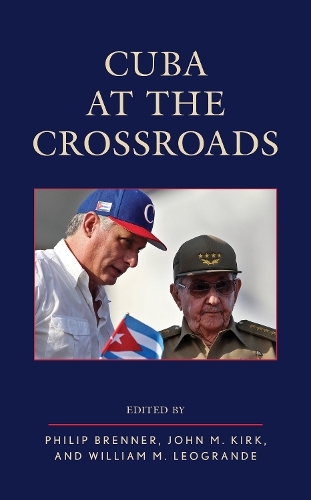
Cuba at the Crossroads
(Paperback)
Publishing Details
Cuba at the Crossroads
By (Author) Philip Brenner
Edited by John M. Kirk
Edited by William M. LeoGrande
Bloomsbury Publishing PLC
Rowman & Littlefield Publishers
5th March 2020
United States
Classifications
Tertiary Education
Non Fiction
International relations
Regional / International studies
972.91
Physical Properties
Paperback
176
Width 155mm, Height 230mm, Spine 13mm
272g
Description
Cuba has undergone dramatic changes since the collapse of European communism. The loss of economic aid and preferential trade with the Soviet Union and other Eastern bloc countries forced the Cuban government to search out new ways of organizing the domestic economy and new commercial relations in an international system dominated by market economies. The resulting economic reforms have reverberated through Cuban society and politics, recreating social inequalities unknown since the 1950s and confronting the political system with unprecedented new challenges. The resulting ferment is increasingly evident in Cuban cultural expression, and the responses to adversity and scarcity have reshaped Cuban social relations. Cuba today faces new challenges with the transition to a new president, Miguel Daz-Canel, and renewed hostility from the Trump administration. This timely book provides a balanced and deeply knowledgeable introduction to Cuba today. This concise overview focuses on Cuba since Ral Castro stepped down as president, bringing together leading scholars to analyze politics, economics, foreign policy, and society in present-day Cuba. Ideally suited for students and all those seeking to understand this still contentious and controversial island, the book includes a substantive introduction setting the historical context, as well as a chronology and primary source documents.
Reviews
Cuba, as the title here indicates, is indeed at a historic crossroads, facing such simultaneous challenges as its transition to new leadership, increased hostility from the Trump administration, an economy that is not performing as well as in recent years, and an international stage that has become more complicated to navigate. This timely book draws upon leading scholars to provide a deeply knowledgeable understanding of the efforts of the government and the islands people to confront and overcome such challengesas they did after the disintegration of the USSR and the Soviet bloc. Both general and more specialized audiences will find this an essential read. -- Michael Erisman, Indiana State University
These authoritative analyses consider the far-reaching national and international circumstances to which Cuba has been obliged to adapt in the past fifteen years. The thematic chapters offer the unrivaled insight of scholars with vast knowledge of Cuba, past and present, who are uniquely qualified to illuminate contemporary Cuban reality. -- Louis A. Prez Jr., University of North Carolina at Chapel Hill
This is a superb and much-needed updating on a constantly changing contemporary scene in Cuban politics, economics, and society. It is written by people in the know and with no axes to grind, which makes it welcome, astute, and objective, just what we need to go beyond the headlines, stereotypical expectations, and outdated readings of Cuba. An excellent addition to our shelves and our understanding. -- Antoni Kapcia, University of Nottingham
Author Bio
Philip Brenner is professor in the School of International Service at American University.
John M. Kirk is professor of Latin American studies at Dalhousie University.
William M. LeoGrande is professor of government at American University.
